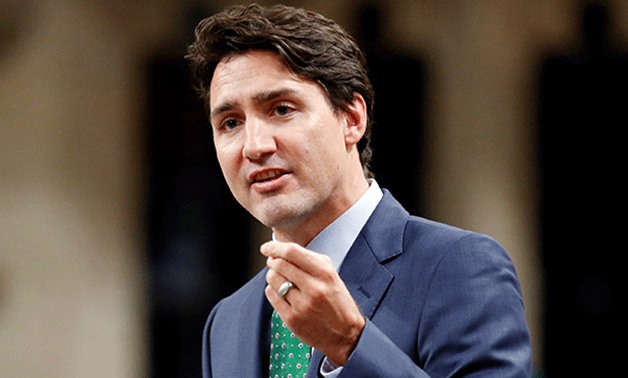
Prime Minister Justin Trudeau answers a question during Question Period in the House of Commons in Ottawa on Wednesday, September 21, 2016. (Adrian Wyld/Canadian Press)
MONTREAL/RIYADH - 9 August 2018: Canadian Prime Minister Justin Trudeau on Wednesday said he would keep pressing Saudi Arabia on civil liberties amid a major diplomatic dispute but also offered an apparent olive branch, saying the kingdom had made some progress on human rights.
Saudi Arabian Foreign Minister Adel al-Jubeir - infuriated by Canada's demand last week that jailed rights activists be released immediately - said earlier on Wednesday that there was no room for mediation, adding that Ottawa knew what it needed to do to "fix its big mistake."
Riyadh on Sunday froze new trade with Canada and expelled the Canadian ambassador. It also ended state-backed educational and medical programmes in Canada.
Trudeau - who referred to the matter as "a diplomatic difference of opinion" - told reporters in Montreal that Foreign Minister Chrystia Freeland had held a long conversation with her Saudi counterpart on Tuesday, but gave no details.
"Diplomatic talks continue ... we don't want to have poor relations with Saudi Arabia. It is a country that has great significance in the world, that is making progress in the area of human rights," he said.
"But we will continue underscoring challenges where and when they exist, in Saudi Arabia and elsewhere," he continued.
On Friday, Canada expressed concern over the arrests of activists in Saudi Arabia, including prominent women's rights campaigner Samar Badawi.
Her brother Raif Badawi, a prominent blogger, is serving a 10-year sentence and has been publicly flogged for expressing dissenting opinions online. His wife and children live in Canada and are Canadian citizens.
A number of women's rights activists, who campaigned for the right to drive and an end to the kingdom's male guardianship system, have been targeted in a government crackdown in recent months, human rights' groups say.
Jubeir said the kingdom was still "considering additional measures" against Canada, but did not elaborate. Canadian investments in Saudi Arabia were still ongoing and would not be affected by the dispute, he said.
The Financial Times, citing unidentified sources, reported that the Saudi central bank and state pension funds had instructed their overseas asset managers to dispose of their Canadian equities, bonds and cash holdings "no matter the cost".
The central bank did not immediately respond to a Reuters query for comment. Canada's foreign ministry said it was seeking clarity from the Saudi Arabian government.
A source at a Saudi bank told Reuters it was contacted by the central bank on Wednesday asking for information about all its Canadian exposure – investments in Canada and foreign exchange positions.
THREAT TO INVESTMENT?
Since rising to power in 2015, Crown Prince Mohammed bin Salman has courted Western allies to support his reform plans, offering billions of dollars of arms sales and promising to fight radicalism in the kingdom.
But the row threatens to slow Riyadh's foreign investment drive, a campaign already unsettled by a series of assertive foreign policy initiatives by the top oil exporter.
"Saudi Arabia simply cannot afford to alienate any other sections of the global community in the midst of its unpopular military engagement in Yemen, its indirect confrontation with Iran," commentator Jamal Khashoggi wrote in the Washington Post.
In addition to the trade freeze, Riyadh has stopped sending patients to Canadian hospitals and told hundreds of trainee doctors to leave Canada with only weeks' notice.
That could disrupt Canadian hospitals and end a 40-year-old program to train specialists for the kingdom.
Saudi authorities also suspended educational exchanges, and moved Saudi scholars to other countries. Saudi's state airline said it was suspending flights to and from Toronto.
Saudi Arabia's main state wheat-buying agency told grains exporters it will no longer accept Canadian-origin grains in international tenders, European traders said.
Bilateral trade between Canada and Saudi Arabia is worth nearly $4 billion a year. Canadian exports to Saudi Arabia were about $1.12 billion in 2017, or 0.2 percent of the total value of Canadian exports.
On Tuesday, Reuters reported that Canada planned to seek help from United Arab Emirates and Britain to defuse the row.


Comments
Leave a Comment